|
Visions are strongly associated with Jerome, though it is necessary
to tread with caution. Only one is described by Jerome himself, and the
Latin word somnium can refer to a vision, or just a
straightforward dream. Having said that, could it be that extreme ascetism,
such as Jerome underwent in the desert, can create a mental state in which visions (or if you will,
hallucinations) are more likely to happen?
This is Jerome's dream in his own words, and two images drawn from it.
|
|
'Many
years ago, when for the kingdom of heaven's sake I had cut myself
off from home, parents, sister, relations, and - harder still - from
the dainty food to which I had been accustomed; and when I was
on my way to Jerusalem to wage my warfare, I still could not bring
myself to forego the library which I had formed for myself at Rome with
great care and toil. And so, miserable man that I was, I would fast
only that I might afterwards read Cicero. After many nights spent in
vigil, after floods of tears called from my inmost heart, after the
recollection of my past sins, I would once more take up Plautus. And
when at times I returned to my right mind, and began to read the
prophets, their style seemed rude and repellent. I failed to see the
light with my blinded eyes; but I attributed the fault not to them, but
to the sun. While the old serpent was thus making me his plaything, about the middle of Lent a deep-seated fever fell upon my weakened body,
and while it destroyed my rest
completely - the story seems hardly credible - it so wasted my unhappy frame that scarcely anything was left
of me but skin and bone. Meantime preparations for my funeral went on;
my body grew gradually colder, and the warmth of life lingered only in
my throbbing breast. Suddenly I was caught up in the spirit and dragged
before the judgement seat of the Judge; and here the light was so bright, and those who stood around were so radiant, that I cast
myself upon the ground and did not dare to look up. Asked who
and what I was I replied: "I am a Christian." But He
who presided said: "Thou liest, thou art a follower of
Cicero and not of Christ. For where thy treasure is, there
will thy heart be also.'" Instantly I became dumb, and
amid the strokes of the lash - for He had ordered me to be scourged - I was tortured more severely still by the fire of conscience, considering
with myself that verse, "In the grave who shall give thee
thanks?" Yet for all that I began to cry and to
bewail myself, saying: "Have mercy upon me, O Lord: have
mercy upon me." Amid the sound of the scourges this cry
still made itself heard. At last the bystanders, falling down
before the knees of Him who presided, prayed that He would have pity on my youth, and that He would give me space to repent of my
error. He might still, they urged, inflict torture on me, should I ever
again read the works of the Gentiles. Under the stress of that awful
moment I should have been ready to make even still larger promises than these. Accordingly I made oath and called upon His name, saying:
"Lord, if ever again I possess worldly books, or if ever
again I read such, I have denied Thee." Dismissed, then,
on taking this oath, I returned to the upper world, and, to
the surprise of all, I opened upon them eyes so drenched with
tears that my distress served to convince even the
incredulous. And that this was no sleep nor idle dream, such as those
by which we are often mocked, I call to witness the tribunal before which I lay, and the terrible
judgement which I feared. May it never, hereafter, be my lot to fall under such an inquisition! I profess that my shoulders were black and blue, that I felt the bruises long after I
awoke from my sleep, and that thenceforth I read the books of God with
a zeal greater than I had previously given to the books of men.'
(Letter 22 To Eustochium)
A guilt trip, then about reading classical (pagan) literature when he
should have been reading the bible.
|
|
A second vision, that of the Trinity, is
almost certainly drawn from the
Regula Monachorum, (rules for
monks) a text once thought to be by Jerome but which was later shown to be
apocryphal. Jerome supposedly describes his desert experiences to
Eustochium:
I have often been among the angelic
choirs; for weeks at a time, feeling no corporeal sensation, I have seen
with the sight of divine vision; after many days, foreknowing things to
come, I returned to myself and wept.
But how perfect
was my happiness there! How unspeakable my delight! My witness is the
Trinity itself, which I saw, I know not with what kind of sight.
The saint on the right (Paula?) appears to be carrying a flail draped over
her shoulder. This, along with the image of Jerome, has led to suggestions
that the painting was commissioned by a flagellant community. Is this
painting a lesson in how to evoke visions? |
|

Vision of the Trinity - Andrea del Castagno
Fresco, Santissima Annunziata, Florence
|
Another frequent 'vision'
image is of an angel blowing a trumpet; there is one in Mei's painting
(above). Guercino's vision (below) shows another. Warning blasts of
judgement to come were a preoccupation for Jerome. Here is an extract from
a letter by Jerome to a soldier who's clearly not doing his stuff:
Pampered soldier, why are you wasting time in your father's house?
Where is the rampart, the ditch, the winter campaign under canvas? Behold
the trumpet sounds from heaven! Our General, fully armed, comes amid the
clouds to overcome the world. From our King's mouth comes the double-edged
sword that cuts down all in its path. Are you going to remain in your
chamber and not come out to join in the battle?
(Letter 14)
|
|

Vision
of St Jerome
Museo della Cittą, Rimini
|
This painting by Parmigianino is sometimes entitled
'Vision of St Jerome' and sometimes 'Madonna and Child with Saints.'
The clue, surely, is that Jerome is fast asleep, even though John the
Baptist isn't. There doesn't appear to be any clear reference to a vision
of the Madonna in Jerome's writings, although her perpetual virginity was
an important idea to him.
It appears that the family commissioning the picture, the
Bufalini's, wanted a Madonna and Child picture, and felt that Jerome (who
trained as a lawyer) was
an appropriate saint to include to represent the family, who were
lawyers.
|
|

National Gallery, London
|
Dreams (I hesitate to say 'visions') of a more earthy nature
are described on the page relating to Jerome's time in the desert.
|
|
St.
Jerome Index
Home page
|




